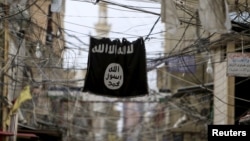A new video released Monday by the Kurdish People's Protection Units in Syria (YPG) showed French female jihadist Emilie Konig refuting allegations she was tortured in captivity in Syria.
Speaking in Arabic and French, Konig described her treatment by Kurdish forces and explained how she arrived in Syria to marry Islamic State fighter Axel Baeza, whom she met via Skype when she was in France.
"I have everything me and my children need. I am investigated here as if I am investigated in my country," Konig said in a video published on YPG's official press page.
Konig, a 33-year-old Muslim convert, infamous IS recruiter and propagandist known for her activities inside and outside France supporting jihadist ideology, had been captured in early December 2017 and held in a Kurdish camp with her children.
Konig's lawyer, Bruno Vinay, confirmed to Agence France-Presse that the woman appearing in the videos was Konig. However, he questioned the conditions in which the video was made.
Last week, France said it will not take back Konig, following a swirling debate in France over the fate of jihadi wives arrested abroad.
Konig, also known as Samra or Umm Tawwab, will face trial in Syria, following assurances that she would get a fair trial, according to French government spokesman Benjamin Griveaux. "In the Kurdish part of Syria, there are judicial institutions that are able to ensure a fair trial with guaranteed rights of defense. They will be judged there," Griveaux said.
Khaled Issa, the representative of the Syrian Kurdish Democratic Union Party to France, confirmed Konig's arrest, assuring that all French prisoners will be treated according to international conventions governing armed conflicts.
"We are able to try her in Syria or hand her over to the French authorities. The will of France will be respected," Issa told La Monde newspaper.
Since July 2012, French authorities have frozen Konig's assets. In September 2014, she was designated a terrorist by the U.N. for "participating in the financing, planning, facilitating, preparing or perpetrating of acts or activities by, in conjunction with, under the name of, on behalf of, or in support of the Islamic State in Iraq and the Levant," the United Nations Security Council stated in its sanctions page. Konig was also listed as a global terrorist by the U.S. Department of State in 2015.
A Jihadi propagandist
Much of Konig's radical influence came from her interaction with outlawed French extremist group Forsane Alizza (Knights of Pride), known for its provocative online speech. Forsane Alizza first appeared on the public stage in 2010 and was dismantled by French authorities in 2012 following a shooting rampage by self-confessed al-Qaida militant Mohammed Merah.
Prior to traveling to Syria in 2012, Konig was an active propagandist for violent extremism in France, where she distributed leaflets in the streets of her hometown of Lorient calling for a holy war. After the dissolution of Forsane Alizza, she created a number of Facebook pages advocating jihad.
Konig left for Syria in 2012 and married an IS fighter who was later killed. According to the French media, Konig was one of the first nationals to travel to Syria for jihad.
She continued promoting violent attacks after joining IS, urging family and friends to target French interests during phone calls and messages intercepted by French intelligence. In one video shown on YouTube, she appeared firing gunshots in Syria. In another video, she addressed her children in France, telling them to remember that as long as there are enemies, jihad will not stop.
Case by case
Konig's 70-year-old mother pleaded to French authorities to bring her daughter back to France and put her on trial there. She said Konig had asked for a pardon during a phone call in July 2017.
"She wanted to come back," Konig's mother said in an interview with Quest-France newspaper. "She asked for forgiveness from her family and friends, from her country. She regrets all her comments and said she wants to pay what she owes to France."
Konig's lawyer issued a statement saying that his client, a mother of three children, must be judged in France, in accordance with French "international commitments."
Last November, French President Emmanuel Macron said the return of French jihadi wives and children would be determined on a case-by-case basis, adding that it "all depends on countries and situations."
According to the French intelligence service, about 1,700 French nationals have joined IS since 2014. Today, 690 French nationals are living in Iraq and Syria. Of those, 295 are women and about 400 are children.




